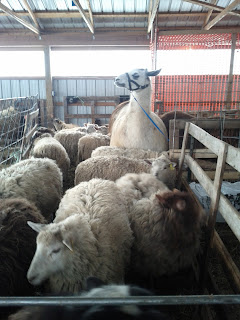A freeway and a few curving country roads later we arrive and step out into the cold. The farm is on a hill so the bitter chill of winter weather (still? it's March) swirls around us along with a few stray sparkling flakes. Magic. My heart jumps with excitement as we near the barn. I can hear the sheep bleating, not as gentle as some would think. They are hungry (no food before shearing), they are scared (why are we up and moving already?) and they don't seem to mind speaking their mind. Blurting out call after call.
It's funny how I love these sort of days but how unaccustomed to them I really am. I clumsily climb over the pen, limb over tangled limb, and introduce myself to Du-Roy, a white Shetland ram. I look at him and my friend unsure of what to do next. She explains to me what "rooing" is. Rooing?
It is the process of gently pulling away the previous years coat and exposing the new years' coat. The wool is thick, and soft, and greasy with lanolin. (Lanolin is an oil that sheep secrete, and before you cringe in disgust, go read the ingredients on your creams and lotions. Its probably listed.)
We wait on shearers and get to know the flock. A moving sea of sheep slowly become recognizable faces. There are two brand new lambs to cuddle and make over. Soft and brown. A week old, but already bouncing, skipping, all energy and wool. Their new faces show none of the fear that is written on faces of the others. Red, the English Shepherd keeps his close watch on mom and babies, his eyes shift as we pass the lambs from person to person.
The shearers finally arrive and the real work begins. There are two quiet young men, tall and lanky, that do the actual shearing. All day their faces shift from the focused scowl of a worker, to the softened smiles of a caretaker. The rest of us are bagging fleeces, sweeping the shearing the stations, handing off the shots and medications for each sheep, and wrangling sheep back into pens.
When it came time for returning sheep to pens, I have things to learn. Some seem to know right where to go. Then there are others. With these, there is plenty of panicking, running, and grabbing, and that's just me. Some sheep bolt past the gate, while others run the opposite direction. A real chase down. Mimosa, a small ewe, standing about a foot and a half off the ground, has me on the ground in a matter of a few seconds. She darts into her pen and we both slowly stand, look at each other, and wonder what just happened. Equally traumatized. With time I am better. Realizing sheep need direction more than force. They need a calming hand, rather than a powerful one. The shearers seem to know this. One of them scoops up the smaller ewes in his arms and carries them gently to the pen himself.
When the sheep are all shorn and the wool all bagged. The sheep enjoy their new lightness, unfazed by the cold. They scratch and shake, and dance their own noisy freedom dance. They rub against each other, reacquainting themselves with what they mistake to be new pen-mates. (Really, they don't recognize each other now.)
The llamas are next.
Octavias (above) and Lucky. Both of which have been aware all day that some part of this would eventually involve them. And they don't seem to like it. The llamas stand and spit, and wobble this way and that, but in the end, they are shorn to, and return to their pens.
The wool is carried into the garage heaping armload after heaping armload. Bag by bag. Some other day it must be cleaned and carded.
We say our goodbyes and head home, cold, tired, and smelling of hay and lanolin. But we are happy.
I arrive home and peel off the many layers in exchange for warm pajamas.
I am asleep, warm on the couch, in a matter of minutes.






